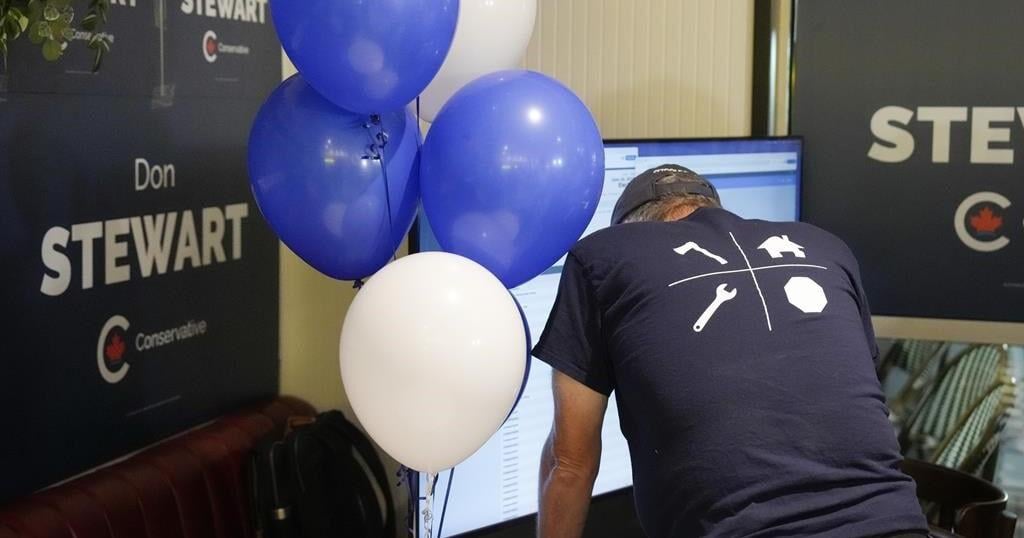Here is a roundup of stories from The Canadian Press designed to bring you up to speed…
Did views on antisemitism sway Toronto byelection?
An organizer who encouraged Jewish residents to vote against the Liberals in this week’s Toronto byelection suggests a rise in antisemitism motivated many to show up at the polls.
Andrew Kirsch, the riding’s Progressive Conservative candidate in the 2018 provincial election, helped launch the Jewish Ally group earlier this year in anticipation of Monday’s vote.
The close race ended with the Liberals suffering a stunning loss and the Tories’ Don Stewart winning by nearly 600 votes.
Kirsch says members of the Jewish community feel “abandoned” by the governing Liberals, and he believes that played a bigger role in the results than any views about the Israel-Hamas war itself.
Both Liberals and Conservatives have acknowledged that the crisis in the Middle East was a factor in a riding where one in six residents identifies as Jewish.
Manitoba RCMP, Crown to provide bus crash update
Manitoba Mounties and a Crown prosecutor are set to provide an update today on an investigation into a bus crash that killed 17 people.
RCMP say the prosecutor is to discuss a decision about charges relating to the crash last June near Carberry, west of Winnipeg.
The bus, carrying seniors to a casino, collided with a semi-trailer while crossing the Trans-Canada Highway.
Police have said the truck had the right of way.
In January, police handed over their findings to the Crown’s office, including forensic reports and interviews with witnesses and survivors.
Video of accused to continue at Coutts trial
The trial of two men charged with conspiracy to commit murder at the border blockade at Coutts, Alta., is expected to hear more from one of the accused in a video statement he gave to police.
About three hours of the video with Anthony Olienick was played earlier this week for the jury.
Olienick tells police in the video that he’s surprised by the charge and never threatened anyone to their face.
He describes the blockade as a peaceful protest and says the federal government is trying to make it appear evil.
Olienick and Chris Carbert were arrested in 2022 after Mounties found a cache of guns, body armour and ammunition in trailers parked in Coutts near the blockade.
Why can’t Canada commercialize its AI strength?
It has impressive research bench strength. It has billions of federal dollars for the taking. It’s kind of a nice place to live.
But when it comes to turning knowledge of artificial intelligence into companies, products and investment, Canada is lagging behind — and, some experts argue, actively shooting itself in the foot.
Why give up all that brain power to Silicon Valley?
That was a major line of questioning as Prime Minister Justin Trudeau spoke recently with tech journalists on a niche New York Times podcast.
“We’re proud of Canada’s early role in developing AI,” Trudeau said on Hard Fork, noting that many breakthroughs have happened because Canadian scientists are well-funded.
In 2017, Canada became the first country to have a national AI strategy. It launched a second phase five years later, allocating $443 million to connect research capacity with programs aimed at enabling commercialization.
Secrets and science of Canada’s ‘super agers’
Angeline Charlebois keeps a busy schedule.
The 105-year-old from Levack, Ontario, plays cards with her friends, bakes, reads and sews hats for babies at the nearby hospital.
She’s part of a growing demographic of so-called super-agers that have sparked the interest of the science community.
Angela Roberts, who’s based at Western University in London, Ont., is the Canadian research lead on an international study looking to uncover what contributes to the long, healthy lives of people like Charlebois.
Roberts says super-agers are defined as people 80 and older who have the memory of someone 20 to 30 years younger.
She says the brain scans of the study participants looked a lot like those of someone in their 50s or 60s because their brains had not atrophied or shrunk at the expected rate for their age.
She says many of the 5,000 people they studied have common traits, and social connection is a key factor.
In entertainment …
—
Shawn Desman on his struggles and career comeback
Shawn Desman says he was convinced his hitmaking pop career was over after his record label dropped him and his life went into a tailspin nearly a decade ago.
It took an unexpected call from Toronto superstar Drake to give the singer a boost of confidence and encouragement to give his career another shot.
Drake handpicked Desman to be part of the lineup at a special concert two summers ago that put a spotlight on the homegrown hip-hop and R&B stars who inspired him growing up.
When Desman took the stage to perform his biggest hits, including “Shook” and “Electric,” he says he was shocked at the positive reaction from the audience.
—
This report by The Canadian Press was first published June 26, 2024
